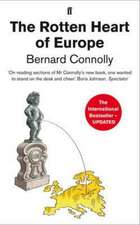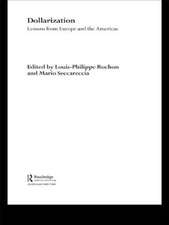Economic Policy Coordination in the Euro Area: Routledge Studies in the European Economy
Autor Armin Steinbachen Limba Engleză Paperback – 14 oct 2024
This book adopts an institutional perspective, exploring the incentives for policymakers that result from coordination mechanisms in the fields of fiscal, monetary and wage policy. Based on the concept of externalities, the work examines cross-border spillovers (e.g. induced by fiscal policy) and cross-policy spillovers (e.g. between fiscal and monetary policies), illuminating how they have empirically changed over time and how they have been addressed by policymakers. Steinbach introduces a useful classification scheme that distinguishes between vertical and horizontal coordination as well as between cross-border and cross-policy coordination. The author discusses farther-reaching forms of fiscal coordination (e.g. debt limits, insolvency proceedings, Eurobonds) with special attention to how principals of state organization affect their viability. Federal states and Bundesstaaten differ in the incentives they offer for debt accumulation – and thus in their suitability for fiscal coordination.
Steinbach finds that the originally strict separation between policy areas has undergone significant change during the debt crisis. Indeed, recent efforts to coordinate policy are no longer limited to one policy area, but now extend to several areas. Steinbach argues that further fiscal policy coordination can be effectively deployed to address policy externalities, but that the coordination mechanisms used must match the form of state organization in the first place. Regarding wage policies, there are significant barriers to coordination. Notwithstanding some empirical successes in the implementation of a productivity-oriented wage policy, the high heterogeneity of national wage-setting institutions is likely to prevent any wage coordination.
| Toate formatele și edițiile | Preț | Express |
|---|---|---|
| Paperback (1) | 258.70 lei 6-8 săpt. | |
| Taylor & Francis – 14 oct 2024 | 258.70 lei 6-8 săpt. | |
| Hardback (1) | 849.48 lei 6-8 săpt. | |
| Taylor & Francis – mai 2014 | 849.48 lei 6-8 săpt. |
Din seria Routledge Studies in the European Economy
-
 Preț: 326.49 lei
Preț: 326.49 lei -
 Preț: 303.87 lei
Preț: 303.87 lei - 17%
 Preț: 148.76 lei
Preț: 148.76 lei - 9%
 Preț: 934.07 lei
Preț: 934.07 lei -
 Preț: 311.41 lei
Preț: 311.41 lei -
 Preț: 316.32 lei
Preț: 316.32 lei - 18%
 Preț: 1062.62 lei
Preț: 1062.62 lei - 18%
 Preț: 1058.65 lei
Preț: 1058.65 lei - 13%
 Preț: 338.33 lei
Preț: 338.33 lei - 25%
 Preț: 524.78 lei
Preț: 524.78 lei -
 Preț: 502.30 lei
Preț: 502.30 lei - 26%
 Preț: 764.62 lei
Preț: 764.62 lei -
 Preț: 466.45 lei
Preț: 466.45 lei - 25%
 Preț: 823.63 lei
Preț: 823.63 lei - 18%
 Preț: 1057.09 lei
Preț: 1057.09 lei - 26%
 Preț: 819.48 lei
Preț: 819.48 lei - 26%
 Preț: 846.50 lei
Preț: 846.50 lei - 18%
 Preț: 1049.99 lei
Preț: 1049.99 lei - 18%
 Preț: 1004.20 lei
Preț: 1004.20 lei - 18%
 Preț: 1337.33 lei
Preț: 1337.33 lei - 26%
 Preț: 765.43 lei
Preț: 765.43 lei - 26%
 Preț: 850.19 lei
Preț: 850.19 lei -
 Preț: 230.56 lei
Preț: 230.56 lei - 18%
 Preț: 703.79 lei
Preț: 703.79 lei - 26%
 Preț: 849.48 lei
Preț: 849.48 lei - 18%
 Preț: 699.96 lei
Preț: 699.96 lei - 25%
 Preț: 828.12 lei
Preț: 828.12 lei - 18%
 Preț: 1167.58 lei
Preț: 1167.58 lei - 18%
 Preț: 1174.70 lei
Preț: 1174.70 lei - 18%
 Preț: 1057.89 lei
Preț: 1057.89 lei -
 Preț: 484.47 lei
Preț: 484.47 lei - 18%
 Preț: 711.10 lei
Preț: 711.10 lei - 26%
 Preț: 848.15 lei
Preț: 848.15 lei -
 Preț: 413.13 lei
Preț: 413.13 lei - 26%
 Preț: 849.65 lei
Preț: 849.65 lei - 26%
 Preț: 875.55 lei
Preț: 875.55 lei - 26%
 Preț: 762.57 lei
Preț: 762.57 lei - 18%
 Preț: 1439.99 lei
Preț: 1439.99 lei - 18%
 Preț: 1108.37 lei
Preț: 1108.37 lei -
 Preț: 494.07 lei
Preț: 494.07 lei - 15%
 Preț: 703.48 lei
Preț: 703.48 lei - 25%
 Preț: 767.07 lei
Preț: 767.07 lei
Preț: 258.70 lei
Preț vechi: 310.75 lei
-17% Nou
Puncte Express: 388
Preț estimativ în valută:
49.51€ • 51.55$ • 41.84£
49.51€ • 51.55$ • 41.84£
Carte tipărită la comandă
Livrare economică 11-25 martie
Preluare comenzi: 021 569.72.76
Specificații
ISBN-13: 9781032927848
ISBN-10: 1032927844
Pagini: 212
Ilustrații: 30
Dimensiuni: 156 x 234 mm
Greutate: 0.39 kg
Ediția:1
Editura: Taylor & Francis
Colecția Routledge
Seria Routledge Studies in the European Economy
Locul publicării:Oxford, United Kingdom
ISBN-10: 1032927844
Pagini: 212
Ilustrații: 30
Dimensiuni: 156 x 234 mm
Greutate: 0.39 kg
Ediția:1
Editura: Taylor & Francis
Colecția Routledge
Seria Routledge Studies in the European Economy
Locul publicării:Oxford, United Kingdom
Public țintă
Academic and PostgraduateCuprins
1. Introduction 2. Asymmetric Shocks and Heterogeneity Following the Creation of the EMU 3. Prerequisies for Coordination and Options for its Designs 4. Coordination in the EU Before the Government-Debt Crisis 5. The Expansion of Coordination in the EU 6. Summary 7. Bibliograpghy
Notă biografică
Armin Steinbach is an economist and lawyer at the German Ministry of Economics in Berlin, Germany. He is the author of books on economic policy and has published in academic journals such as the Journal of International Economic Law, Columbia Journal of European Law and American Review of International Arbitration. He held visiting scholar positions at Harvard and Oxford University and received a doctorate in law from University of Munich and a doctorate in economics from University of Erfurt in Germany.
Descriere
The book provides a new perspective on the evolution of economic policy coordination in the European Union (EU), using the notion of externalities across countries and interdependences across policies to explain the new governance in EU economic policy. Written in response to the current Eurozone crisis, the book provides the first comprehensive



















